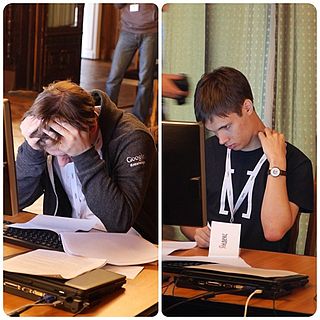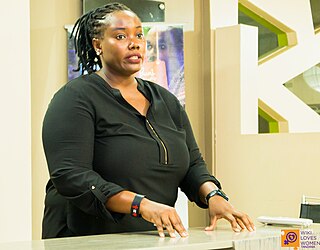
A hackathon is an event where people engage in rapid and collaborative engineering over a relatively short period of time such as 24 or 48 hours. They are often run using agile software development practices, such as sprint-like design wherein computer programmers and others involved in software development, including graphic designers, interface designers, product managers, project managers, domain experts, and others collaborate intensively on engineering projects, such as software engineering.

Women in computing were among the first programmers in the early 20th century, and contributed substantially to the industry. As technology and practices altered, the role of women as programmers has changed, and the recorded history of the field has downplayed their achievements. Since the 18th century, women have developed scientific computations, including Nicole-Reine Lepaute's prediction of Halley's Comet, and Maria Mitchell's computation of the motion of Venus.

Steve Blank is an American entrepreneur, educator, author and speaker. He created the customer development method that launched the lean startup movement. His work has influenced modern entrepreneurship through the creation of tools and processes for new ventures which differ from those used in large companies.

Competitive programming or sport programming is a mind sport involving participants trying to program according to provided specifications. The contests are usually held over the Internet or a local network. Competitive programming is recognized and supported by several multinational software and Internet companies, such as Google, and Meta.

Codecademy is an American online interactive platform that offers free coding classes in 12 different programming languages including Python, Java, Go, JavaScript, Ruby, SQL, C++, C#, and Swift, as well as markup languages HTML and CSS. The site also offers a paid "Pro" option that gives users access to personalized learning plans, quizzes, and realistic projects.
Dev Bootcamp was an immersive 19-week coding bootcamp founded by Shereef Bishay, Jesse Farmer, and Dave Hoover in February 2012. It was designed to make graduates job-ready by the end of the program. Dev Bootcamp was headquartered in San Francisco, California, with additional locations Seattle, Chicago, New York City, Washington, D.C., San Diego, and Austin. It was acquired by for-profit education company Kaplan, Inc in 2014. Dev Bootcamp closed in 2017.

Deerwalk Institute of Technology provides extensive undergraduate programs, namely the Bachelor of Science in Computer Application and Information Technology (B.Sc.CSIT) and the Bachelor of Computer Applications (BCA). These programs are affiliated with Tribhuvan University.
CodeDay is a non-profit organization which promotes STEM education for high school and college students.
Titstare is a fictional mobile application centred on pictures of men staring at women and their breasts. It was introduced at a 2013 hackathon at TechCrunch's TechCrunch Disrupt conference in San Francisco, California by two Australian developers. Titstare became the subject of public controversy, with the skit being described as symptomatic of sexist attitudes in Silicon Valley's startup culture. Conference organizers later apologized for the misogynistic presentation.

HackerRank is a technology company that focuses on competitive programming challenges for both consumers and businesses. Developers compete by writing programs according to provided specifications. HackerRank's programming challenges can be solved in a variety of programming languages and span multiple computer science domains.

HackerEarth is a software company headquartered in San Francisco that provides enterprise software that assists organizations with technical hiring. HackerEarth is used by organizations for technical skill assessments and remote video interviewing. In addition, HackerEarth also has built a community of over 4 million developers. HackerEarth has raised $11.5 million in funding over three rounds. Currently, more than 750 customers worldwide use its technical coding assessments platform, including Amazon, Walmart Labs, Thoughtworks, Societe Generale, HP, VMware, DBS, HCL, GE, Wipro, Barclays, Pitney Bowes, Intel, and L&T Infotech. HackerEarth is backed by GSF Global and Angelprime.
Junction is a hackathon organizer with headquarters Espoo, Finland. Started in 2015, Junction grew to be one of the largest organizers in Europe. In 2018 it expanded globally with a Junction event at Tsinghua University in China and cooperation with Chinese and South Korean universities bringing high performing students to attend the event in Helsinki.

Gender disparity in computing concerns the disparity between the number of men in the field of computing in relation to the lack of women in the field. Originally, computing was seen as a female occupation. As the field evolved, so too did the demographics, and the gender gap shifted from female dominated to male dominated. The believed need for more diversity and an equal gender gap has led to public policy debates regarding gender equality. Many organizations have sought to create initiatives to bring more women into the field of computing.
The National Security Innovation Network is a United States Department of Defense (DoD) program office under the Defense Innovation Unit that seeks to create new communities of innovators to solve national security problems. NSIN partners with national research universities and the venture community to reinvigorate civil-military technology collaboration. As opposed to making investments in specific technologies, government research and development programs, or startups, NSIN focuses on human capital innovation – i.e., developing and enabling innovators and human-centered networks to solve national security problems. In support of this mission, NSIN provides tools, training, and access to DoD assets that enable entrepreneurs and intrapreneurs to develop and commercialize high potential products in the national interest.
Conor Russomanno is an American entrepreneur, inventor, and public speaker, specializing in the development of advanced human-computer interfaces. He is the co-founder and CEO of OpenBCI, a company dedicated to open source innovation of brain-computer interface technologies. Russomanno has also served as an adjunct professor at Parsons School of Design and NYU Tisch School of the Arts, and as a Research Affiliate at the MIT Media Lab. In 2018, he was honored on the Forbes 30 Under 30 list in the category of Science. In April 2023, Russomanno delivered a TED Talk that featured a spectacular assistive technology BCI and AR demonstration to help a friend living with severe motor disabilities, Christian Bayerlein, fly a drone over the audience.

Phandeeyar was a technology seed accelerator based in Yangon, Myanmar. Formally beginning in 2015, Phandeeyar provides funding and training for emerging startups. Phandeeyar also conducts trainings, hosts workshops, and holds competitions for startups within the digital sector.

Rose Peter Funja is a Tanzanian software engineer and developer. She was a dean at the College of Science at the University of Bagamoyo, lecturing on ICT.

Hack Club is a global nonprofit network of high school computer hackers, makers and coders founded in 2014 by Zach Latta. It now includes more than 500 high school clubs and 31,000 students. It has been featured on the TODAY Show, and profiled in the Wall Street Journal and many other publications.
The Center for Excellence in Wireless and Information Technology (CEWIT) was established in 2003 as the main structure in the SUNY Stony Brook University Research and Development Park, They opened the new and current building in March 2009

Kat Calvin is an African-American activist, entrepreneur, and author. She is the founder of Spread the Vote and Project ID and the Co-founder of Blerdology. Calvin's organization supports Americans to obtain their IDs for housing, jobs, and voting. Additionally, Calvin advocates for advanced minority representation in the STEM field.











